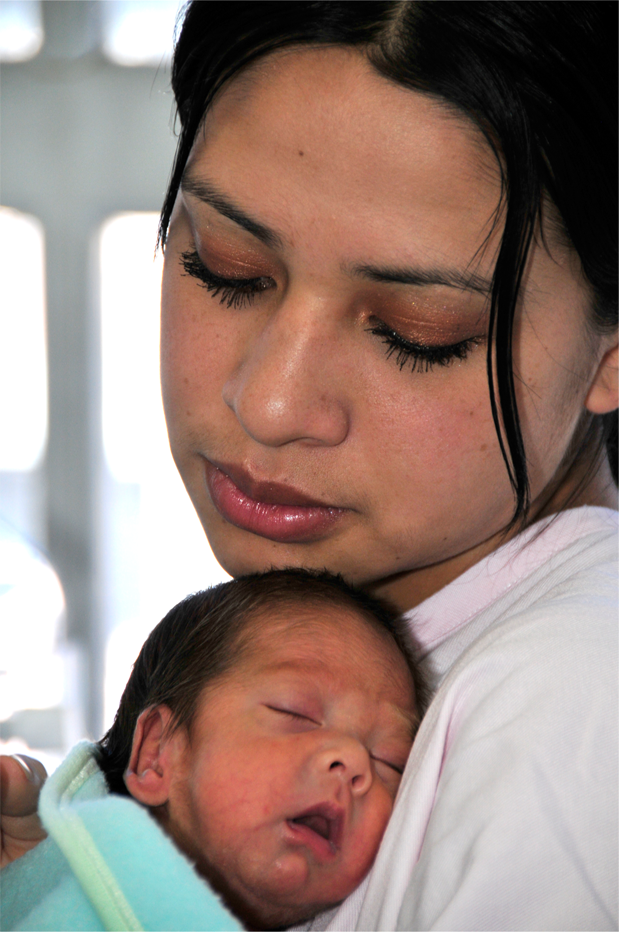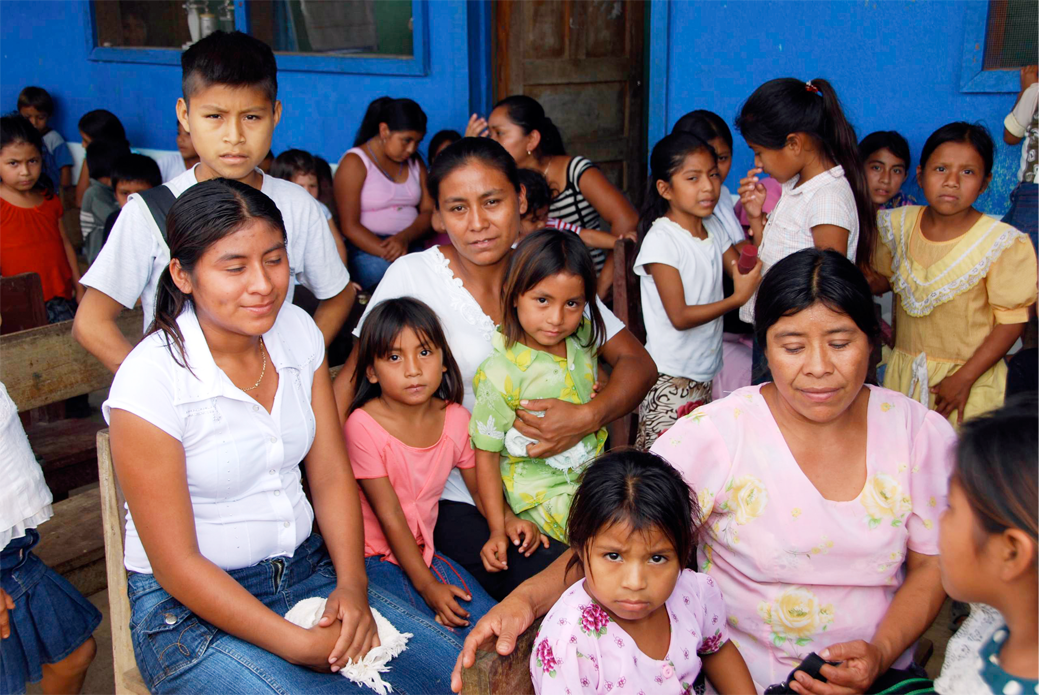Universal access to health services and social protection is fundamental to achieving health equity and central to the renewed vision of primary health care. The concept has wide support among PAHO member countries. Universality is one of the main principles of the Health Agenda for the Americas 2008–2017, and increasing social protection and access to quality health services is one of the agenda’s eight priority action areas.
In 2008–2009, PAHO Member States made significant progress toward universal access to health through new laws and policy frameworks as well as through concrete programs on the ground. Highlights of PAHO’s technical cooperation in support of these advances are presented below.
 In Bolivia, PAHO has provided support for a program that promotes prenatal care for pregnant women without health insurance. The Juana Azurduy de Padilla bond program pays expectant mothers 50 bolivianos (about US$7) for each prenatal checkup they attend and an additional 120 bolivianos if they give birth in a state health center. The women also receive 125 bolivianos for each bimonthly check-up they take their child to, up to the child’s second birthday. The initiative began to be implemented in May 2009 in all of the country’s municipalities. PAHO is supporting the development of infrastructure and human resources needed to provide the health services offered under the program.
In Bolivia, PAHO has provided support for a program that promotes prenatal care for pregnant women without health insurance. The Juana Azurduy de Padilla bond program pays expectant mothers 50 bolivianos (about US$7) for each prenatal checkup they attend and an additional 120 bolivianos if they give birth in a state health center. The women also receive 125 bolivianos for each bimonthly check-up they take their child to, up to the child’s second birthday. The initiative began to be implemented in May 2009 in all of the country’s municipalities. PAHO is supporting the development of infrastructure and human resources needed to provide the health services offered under the program.
In Colombia, PAHO is supporting national efforts to expand health coverage through two initiatives that target special populations. In the first, PAHO helped the Ministry of Social Protection form a special technical group (mesa técnica) charged with developing alternative and multicultural models of primary health care that guarantee the expansion of social protection and access to quality health services for people living in remote areas. The first models are being implemented in the department of Chocó in 2009–2010, with plans to extend their implementation to Colombia’s Pacific Coast areas.
In the second, PAHO has promoted the extension of health coverage to people displaced by conflicts, who make up 9–12 percent of the Colombian population. PAHO has supported outreach and training through the Route to Health (Ruta de la Salud) initiative, which educates authorities and displaced people about their respective rights and duties, and teaches displaced people how to get access health services in their new locations. PAHO also designed a computer program, SIGA, that tracks government health expenditures on these populations, helping to increase accountability and ensure sustained funding for these efforts.
In Costa Rica, PAHO provided technical cooperation to help develop a model for guaranteed access to health services and for expanding coverage to formerly excluded populations. It emphasizes a basic package of services that are the responsibility of the state and includes a strategy for providing in-home care as a fundamental element of primary health care and as a way of rationalizing the use of health resources.

PAHO contributed to the health focus of Ecuador’s new constitution, approved in September 2008. It codifies the right of all citizens to sumac kawsay, Kichwa for “good living,” through access to health care and key social determinants of health such as education, nutrition, and housing. The new constitution is part of a larger legal and development framework known as the National System of Inclusion and Social Equity.
The new constitution specifies that the National Health System must be based on primary health care and must offer a comprehensive public network that operates according to the principles of universality and equity, under the leadership of the national health authority. Article 32 says the system must provide “permanent, timely, and nonexclusive access to programs, actions, and services in health promotion, comprehensive health care, and sexual and reproductive health.” The document also says the state must guarantee the right to health through its economic, social, cultural, educational, and environmental policies.
A number of articles in the constitution directly support the implementation of the Sectoral Transformation of Health in Ecuador (TSSE), a government reform effort that seeks to reorganize the health system according to the principles of equity, quality, efficiency, participation, pluralism, solidarity, and universality. Various articles specifically support the TSSE’s seven main components: strengthening of the national health authority, administration and management of the national health system, network of public health services and comprehensive care model, financing of the national health system, auditing and monitoring of the national health system, information management in health, and citizen participation and social control. The objective is a national health system that guarantees “universal, progressive and free” access to quality health services based on a comprehensive care model emphasizing health promotion, prevention, and primary care.
With financial support from the Canadian International Development Agency (CIDA), PAHO helped the Ministry of Health of Haiti develop a strategy to reduce maternal and infant mortality by ensuring free access to prenatal, delivery, neonatal, and post-natal care in 47 health facilities nationwide. Preliminary results show a notable increase in institutional deliveries, a better response to obstetric emergencies, and 70–80 percent satisfaction among beneficiaries regarding the quality of care. These results have helped get a proposed Social Protection in Health policy onto both the domestic and the international cooperation agendas in Haiti.
In Honduras, PAHO has supported efforts to expand health coverage based on the renewed vision of primary health care and including the decentralization of health services. Using a primary health care framework, the Ministry of Health has reorganized the health services in 20 regions, implementing new models of care in 29 health units in 10 municipalities. By the end of 2008, the third year of the strategy’s implementation, 60,000 families in 1,142 rural communitieshad been served by the reorganized services. PAHO has also signed a letter of understanding to provide a course in development of institutional capacities in primary health care for personnel from the Honduran Social Security Institute, to support its implementation of the program Comprehensive Care in Family and Community Health, which seeks to expand coverage and improve quality of care.
In Panama, PAHO helped develop and launch a new “Situation Analysis and Health Plan for Indigenous People in Panama.” It has a primary health care focus and sets out a five-year strategy for improving indigenous health through a participatory process that includes meetings with indigenous leaders from different ethnic groups throughout the country.
In Paraguay, PAHO helped the Ministry of Health develop a new National Policy on the Health of Indigenous Peoples to fight exclusion from access to health care. The plan emphasizes primary health care and community participation, and includes the creation of mobile health teams and training of human resources using an intercultural perspective. It is being implemented through alliances with local governments, nongovernmental organizations, and UNICEF.
In Peru, PAHO is supporting the implementation of a new Law on Universal Insurance, which was passed to complement existing insurance schemes linked to employment with the government or private enterprise. It establishes public health insurance financed with public funds to provide coverage for low-income people. To support the law’s implementation, PAHO is spearheading an effort to strengthen the capacities of health workers based on the primary health care model. The law is currently being implemented in seven pilot areas that are among the country’s poorest regions.
In Uruguay, PAHO supported the development and implementation of a new National Integrated Health System, which unifies the private and public subsystems under a single structure, eliminating fragmentation and reducing inequities in access to care. PAHO also supported the creation of Uruguay's new National Health Fund, which incorporates a number of preexisting insurance schemes into a single national health insurance plan, providing coverage to the entire population. As part of its support, PAHO helped Uruguay develop a new model of care based on the primary health care strategy, create a guaranteed portfolio of entitlements (Integral Health Care Plan), and establish mechanisms to implement the new system and the new fund, which have enabled the country to achieve universal coverage.
PAHO’s Latin American Center for Perinatology and Human Development (CLAP) supported efforts to increase coverage of maternal services and reduce maternal mortality through technical cooperation in the northeastern provinces of Argentina, the Sembrando program in Peru, Arranque Parejo in Mexico, and related initiatives in Haiti, Honduras, and Guyana.